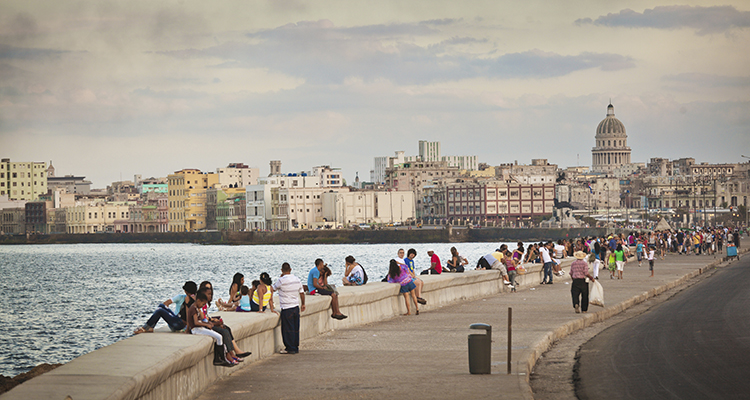As Cuba opens up for Americans, 11 students in the International Leadership Program and two from the Murray Institute will be among the first to witness the island country’s transition. The Obama administration’s announcement that it would begin lifting the 50-year-old embargo came on the heels of another announcement – an international leadership study abroad experience in Cuba.
Every summer, the Master of Arts in International Leadership program offers the opportunity to spend about two weeks in the Global South, an academic term for developing countries. Africa, South Africa and Tanzania have been the destination for the past three summers, but program director Father Jean-Pierre Bongila, Ed.D. wanted to offer a study abroad opportunity in another part of the Global South this June.
The US policy change couldn’t have been timed better. Bongila had just returned from a site visit in Cuba when President Obama’s announcement made headlines.
“I immediately realized that the time was right,” Bongila said of restoring US-Cuba relations, “and it’s going to be interesting for our students to see that.”
Bongila sensed a new spirit of commerce and openness in the country during his visit. The majority of Cuban people Bongila approached during his recent visit spoke of small but significant changes on the island over the last three years. Foreigners and tourists were now allowed to mingle with the locals. Small private businesses exist – such as the family hostel where Bongila lodged – and privately run cafes and restaurants have cropped up here and there. Cuba also has two currencies circulating – one for visitors from outside the country and one for residents. Bongila expects that the thawing of US Cuba relations and the easing of restrictions within the country will intensify the cultural exchange between students and their Cuban hosts.
Edmond Ngeh, M.A. ’15, is looking forward to exploring Cuba at this pivotal moment.
“This is a very unique opportunity of seeing development in leadership taking place,” Ngeh said.
However, students will still get a taste of the stark realities of living in a Marxist-socialist regime.
“Students will learn something new in terms of lack of freedom as we know it,” Bongila said. “I think it will be a shock to experience a wall when it comes to talking about politics.”
But Bongila wants to induce a bit of “culture shock” and believes that students need to understand that many Cubans remain reticent to talk about politics or criticize their government. At the same time, the course will show students the successes of the Cuban system. The country has a very effective health care and education, according to Bongila. Cuban medical professionals serve in various parts of the Global South and literacy is 100 percent, higher than the US average of 95 percent.
“They should see that the perception we have of Cuba might be a little different than the reality,” Bongila said.
During the course, students will visit a hospital, a medical school, the University of Havana and other schools. Each day includes a lecture by a Cuban professor, a related field experience and a cultural experience. Students will also delve into Cuba’s fascinating history, from colonial times and the African slave trade, to its democratic period and subsequent revolution led by Che Guevara.
Bongila also wants students to make a lasting connection with Cuba.
“I hope some students will become so connected that they return on their own,” he said. “The goal is to find some place where we as a university can invest our efforts.”
Bongila said that some students who are also teachers have remained in contact with Saint Jude’s school in Tanzania for continued cultural exchanges and to support the school. Finding a similar way to contribute back to Cuba would enhance the university’s decades-long connection with the country. President Emeritus, Father Dennis J. Dease, made numerous trips to Cuba, including taking the university’s board of trustees and the baseball team.
The study abroad is officially EDLD 869: Leadership in International Contexts of Cuba. Part of the academic work includes blogging back to the states during the two weeks in Cuba – check back for a link to the students’ live blog.







